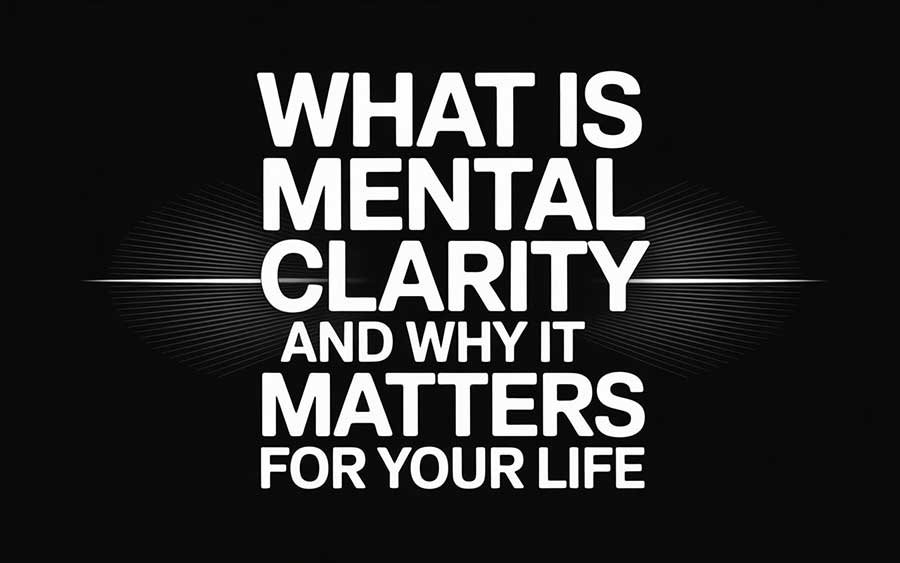
What Is Mental Clarity and Why It Matters for Your Life
In a world buzzing with constant stimulation—emails, texts, social media pings, to-do lists, and daily demands—it’s easy to feel overwhelmed. This never-ending stream of noise clouds our minds, creates stress, and makes it hard to stay focused on what truly matters. That’s where mental clarity comes in.

Mental clarity is more than just a peaceful mind—it’s a foundation for making better decisions, maintaining emotional balance, and living a more intentional, fulfilled life. Without clarity, we drift. With it, we thrive.
This article will take you on a deep dive into what mental clarity really means, why it’s essential for your personal growth and success, what blocks it, and exactly how to cultivate it in your daily life. Along the way, you’ll hear real-life examples and inspiration that show just how transformative clarity can be.
What Is Mental Clarity?
Mental clarity is the ability to think clearly, focus your attention, and direct your energy toward meaningful goals without being derailed by mental fog, emotional turbulence, or external distractions. It’s the opposite of feeling scattered, reactive, or overwhelmed.
When you have mental clarity:
- Your thoughts are ordered
- Your emotions are balanced
- Your focus is sharp
- You respond instead of react
- You make decisions with greater confidence
Mental clarity allows you to cut through the noise, tune in to your inner wisdom, and lead a life that’s aligned with your true values.
The Science Behind It
Clarity isn’t just a spiritual or emotional state—it has a biological basis. A cluttered mind often stems from overstimulation of the prefrontal cortex, the part of the brain responsible for decision-making, planning, and self-control. When this area is overloaded with information or emotional stress, your cognitive function slows down.
Stress hormones like cortisol also interfere with mental clarity. Chronic stress causes the brain to focus on survival, which limits higher-level thinking. That’s why people often feel foggy, forgetful, or indecisive when they’re under pressure.
Why Mental Clarity Matters
Mental clarity isn’t just nice to have—it’s essential. Here’s why:
1. Improved Decision-Making
When your mind is clear, you can process information more efficiently and choose actions that align with your goals.
2. Greater Productivity
With clarity, you stop wasting time on distractions or indecision. You’re able to focus deeply, accomplish more, and feel less drained.
3. Emotional Resilience
A clear mind helps you detach from emotional overwhelm and stay grounded, even during conflict or stress.
4. Enhanced Creativity
Clarity creates mental space for innovation. You begin to notice new connections and solutions you’d miss in a cluttered state.
5. Personal Fulfillment
Clarity allows you to live on purpose instead of autopilot. You’re more aware of your values and more likely to pursue goals that matter.
What Kills Mental Clarity
Mental fog doesn’t come out of nowhere. It’s usually the result of cumulative habits and environments. Let’s break down the major culprits.
1. Constant Multitasking
The human brain isn’t wired to do several things at once. Multitasking leads to shallow focus, more errors, and less retention.
2. Digital Overload
Notifications, social media, and 24/7 connectivity make it hard to stay present. Every ping fractures your attention.
3. Unprocessed Emotions
When you ignore your feelings, they pile up and turn into mental baggage. This creates inner chaos that clouds thinking.
4. Poor Sleep Hygiene
Lack of sleep is one of the top causes of mental fog. Your brain needs downtime to consolidate memory and refresh its focus.
5. Neglecting Your Physical Health
Nutrition, hydration, and movement directly impact your mental state. An inflamed or dehydrated brain can’t function at full capacity.
Real-Life Examples of Mental Clarity in Action
Jasmine – From Burnout to Boundaries
Jasmine was a high-performing executive who always said yes—to everything. Eventually, the weight of expectations led to panic attacks and confusion. She took a two-week break, unplugged from technology, and began daily yoga and journaling. Today, she says mental clarity helped her prioritize what really matters—her well-being and purpose.
Noah – Beating the Overthinking Cycle
Noah was stuck in his own head. Every decision felt overwhelming. After working with a coach, he discovered how overanalyzing was killing his clarity. He began meditating for 15 minutes every morning and started using the 2-minute rule for small decisions. The result? More action, less mental paralysis.
Amina – Finding Focus as a Mom of Three
With three kids under seven and a side business, Amina was always tired and frazzled. She began waking up an hour earlier to journal, plan her day, and stretch. This small act of self-care helped her feel grounded and focused, even in the chaos of daily life.
How to Cultivate Mental Clarity: Step-by-Step
1. Declutter Your Mind Each Morning
Use journaling or a brain dump to offload everything crowding your thoughts. This clears the slate for focused thinking.
2. Create a Distraction-Free Zone
Designate blocks of your day with no screens, notifications, or interruptions. Protect your focus.
3. Use the Power of Silence
Spend at least 10 minutes a day in silence—no phone, no input. Let your mind rest and recalibrate.
4. Set Clear Daily Intentions
Start your day by naming your top 1–3 priorities. This gives your brain direction.
5. Take Regular Movement Breaks
Walk, stretch, or do breathing exercises every 60–90 minutes. It boosts circulation and clears mental fatigue.
6. Establish a Night Routine
Wind down with screen-free time, light reading, or reflection. Quality sleep is essential for clarity.
7. Stay Hydrated and Nourished
Drink plenty of water and eat clean, brain-supportive foods. Avoid processed sugars and excess caffeine.
8. Practice Saying No
You can’t think clearly if you’re overcommitted. Protect your mental bandwidth with strong boundaries.
9. Be Present in the Moment
Mindfulness isn’t just meditation—it’s paying attention fully to what you’re doing. Be here now.
20 Quotes on Mental Clarity
- “Clarity affords focus.” – Thomas Leonard
- “The clearer your thoughts, the clearer your path.” – Unknown
- “Mental clarity leads to personal power.” – Robin Sharma
- “Peace is the result of retraining your mind.” – Wayne Dyer
- “A cluttered mind cannot think clearly.” – Unknown
- “The key to success is clarity.” – Tony Robbins
- “Stillness is the foundation of clarity.” – Eckhart Tolle
- “You can’t think clearly when your heart is full of noise.” – Unknown
- “Order your mind, and your life will follow.” – Unknown
- “Mental clarity begins when you remove what no longer serves you.” – Unknown
- “Simplicity is the ultimate sophistication.” – Leonardo da Vinci
- “Slow down. Clarity comes in the pause.” – Unknown
- “Focus on what matters, and clarity will come.” – Marie Forleo
- “Clear intentions lead to clear results.” – Brendon Burchard
- “When your mind is clear, your decisions are pure.” – Unknown
- “Mental clutter is the enemy of success.” – Brian Tracy
- “The more you simplify, the more clarity you find.” – Unknown
- “Silence is the language of clarity.” – Ram Dass
- “Clarity comes from engagement, not thought.” – Marie Forleo
- “Let go of the noise to hear your truth.” – Unknown
Picture This
Imagine waking up without your mind racing. No dread. No chaos. You sit with your coffee, not scrolling—but breathing. You know your top priorities, and you move through the day with calm, steady focus. You’re not reacting—you’re responding, with intention. Your space is tidy, your thoughts are organized, and your choices are aligned with what matters most.
This is what it feels like to live with mental clarity. Not perfect. Not silent. But peaceful. Purposeful. Empowered.
And it’s available to you, starting now.
Please Share This Article
If this article helped you understand or reclaim your mental clarity, please share it with someone else who needs a fresh start. Whether it’s a friend, coworker, or family member—you could be the spark that clears their fog.
Disclaimer
This article is for informational purposes only. It is based on personal experience and public research. It is not medical or psychological advice. Please consult a healthcare or mental health professional for personalized support.






